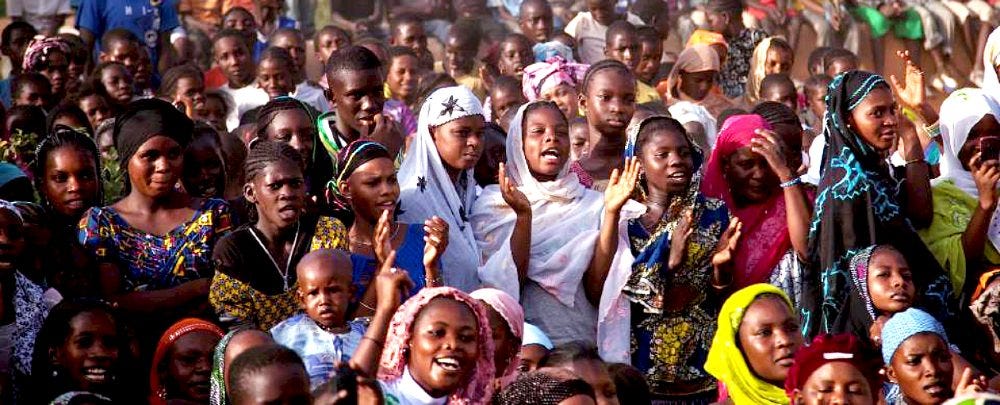Commentary: Why the World Can’t Afford to Ignore Africa’s Youth and Security Crisis
A review of the latest CSIS report on Africa
By M. Nuri Shakoor, SRMP-C INSSA.org

Why Africa's Youth and Security Crisis Matter: The Global Impact and Importance of U.S. Engagement
As election season heats up in the U.S., the world is watching. But while much attention remains on debates about AI, climate change, and the geopolitical dance between Washington, Moscow, and Beijing, an equally important drama is unfolding in Africa—one with profound global implications. If we fail to heed the lessons from the latest reports from the CSIS Africa Program, we risk missing the most important geopolitical story of the next decade: the transformation of Africa’s political, economic, and security landscape.
Africa, home to some of the world’s fastest-growing economies and youngest populations, isn’t just on the periphery of global politics. It’s at the heart of it. By 2050, one-quarter of the world’s population will be African, and this isn’t some footnote in a U.N. demographic report. It’s the single most important factor shaping the future of global labor markets, economic innovation, and even migration flows. And yet, Europe’s outdated approach to Africa, increasingly militarized and defensive, is setting itself up for failure—again.
The Demographic Time Bomb (and Opportunity)
Take this: Africa’s median age is just 19. That’s nearly half the median age of Europe, whose leaders continue to act as if fortifying borders and throwing money at migration issues will solve the problems ahead. It won’t. The CSIS’s Africa Program highlights this mismatch brilliantly. Africa’s youth, particularly in countries like Nigeria and South Africa, are sitting on a vast reservoir of untapped talent and energy. Yet many are stuck between corrupt governance structures and a global economy that doesn’t seem to care.
Here’s the kicker: if Europe (and, let’s be honest, the U.S. too) doesn’t rethink its engagement with Africa’s youth, it will pay the price in mass migration, security crises, and missed opportunities for partnership with one of the most innovative young populations in the world. The current militarized approach to migration does nothing but kick the can down the road, as African leaders watch, bewildered by Western incompetence in grasping the scale of what’s at stake.
Mozambique’s Insurgency: A Canary in the Global Coal Mine
Mozambique, a country that has grappled with an Islamist insurgency since 2017, stands at the crossroads of chaos and opportunity. The CSIS Africa Program underscores the stakes of Mozambique’s October election, where the insurgency in Cabo Delgado province looms large. This isn’t just a local conflict. It’s part of a broader global trend—of governments ill-prepared to handle security threats at home, much less manage foreign intervention when things spiral out of control.
Russia, China, and increasingly private military contractors have filled the vacuum left by inconsistent Western engagement. If you think this is someone else’s problem, consider that Mozambique sits on some of the world’s largest untapped natural gas reserves, reserves that Western energy companies have been eyeing for years. Insurgent violence has already disrupted gas projects and could further destabilize global energy markets. If Mozambique goes under, the ripples will be felt in every corner of the world.
The Sahel: A Powder Keg Waiting to Explode
Then there’s the Sahel, where instability has become the norm. Military coups, terrorist groups, and foreign meddling—especially by Russia’s Wagner Group—have turned the region into a geopolitical minefield. The CSIS Africa Program lays out how this region, in particular, will test the resolve of any incoming U.S. administration. Inconsistent policies, a lack of coordination with European allies, and an overwhelming focus on Russia’s influence have left the Sahel teetering on the edge. What’s clear is that any long-term solution in the Sahel, or any part of Africa, will require much more than military aid or punitive economic measures.
The U.S. has an opportunity, here and now, to reset its relations with the region. Not by sending drones or troops, but by empowering local governance, building stronger educational systems, and providing platforms for African youth to thrive. Africa’s young people—educated, eager, and disillusioned by the West’s apathy—will remember who showed up for them, and more importantly, who didn’t.
Global Implications: Why You Should Care
Why should the rest of the world care about these crises in Africa? The answer is simple: what happens in Africa will shape global markets, migration patterns, and even the stability of Western democracies. Africa’s security crises—from Mozambique to the Sahel—aren’t isolated conflicts; they’re the canaries in the coal mine for global instability. If Western governments continue to ignore the root causes—bad governance, youth unemployment, and external exploitation—the world will face bigger problems down the line.
And let’s not forget about the climate. Africa’s vulnerability to extreme climate events, from droughts to cyclones, will have far-reaching impacts. Mozambique, again, stands as an example where climate shocks not only worsen internal conflict but also affect global energy supplies and migration. Climate change isn’t just a threat to polar bears; it’s destabilizing entire nations, and Africa will be the frontline in this battle.
In short, Africa’s future isn’t just Africa’s problem—it’s ours. As the CSIS Africa Program consistently reminds us, the decisions made today, both in Africa and by global powers, will determine the trajectory of global stability for decades to come. The U.S., Europe, and the rest of the world can no longer afford to be indifferent. It’s time to act—not with knee-jerk militarized responses but with thoughtful, consistent engagement that prioritizes Africa’s people, especially its youth.
If not, we’ll be watching not just Africa’s future go up in flames, but our own too.
Source:
Cha, V., & Szechenyi, N. (Eds.). (2024, September). The global impact of the 2024 U.S. presidential election. Center for Strategic and International Studies (CSIS). https://www.csis.org/programs/geopolitics-and-foreign-policy


